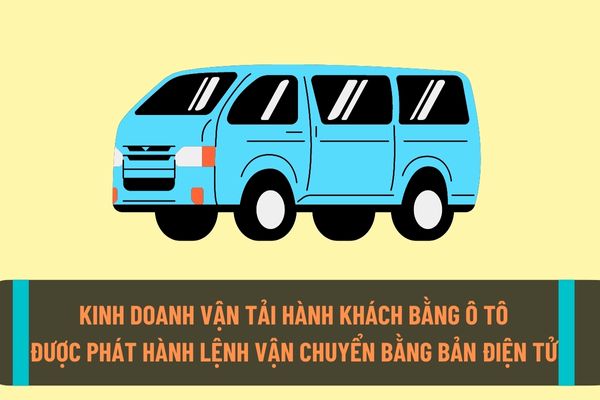Unit Operating Fixed-route Passenger Transport by Automobile Will Issue Electronic Transport Orders from September 15, 2022?
In the near future, can passenger transport businesses operating fixed routes by cars use electronic transport orders?
Based on Article 25 Circular 12/2020/TT-BGTVT providing regulations as follows:
“Article 25. Regulations on Transport Orders1. The transport order is self-printed by enterprises or cooperatives according to the form specified in Appendix 6 issued with this Circular. Besides the mandatory contents specified in Appendix 6, enterprises or cooperatives can add other contents to serve the management work of the unit.2. Enterprises or cooperatives are responsible for managing, issuing, and inspecting the use of Transport Orders; storing executed Transport Orders for at least 03 years.3. Passenger car stations are responsible for updating the information on transport orders that have been stamp-certified into the national bus station management software.”
Currently, passenger transport businesses operating fixed routes self-print the transport orders. This means that currently, passenger transport businesses operating fixed routes can only use paper transport orders.
However, this regulation will change in the near future. Specifically, Clause 3 Article 1 Circular 17/2022/TT-BGTVT provides as follows:
“Article 1. Amendments and supplements to a number of articles of Circular 12/2020/TT-BGTVT dated May 29, 2020, by the Minister of Transport on the organization and management of transport operations using cars and road transport support services....3. Amendment and supplementation of Clause 1 Article 25 as follows:*> “1. The transport order, whether in paper or electronic form, is self-issued by enterprises or cooperatives according to the form specified in Appendix 6 issued with this Circular. Besides the mandatory contents specified in Appendix 6, enterprises or cooperatives can add other contents to serve the management work of the unit.When conducting a trip, the driver must carry the paper transport order or have a device that can access the content of the electronic transport order; present the paper or electronic transport order upon request by competent authorities.The provision of information on the transport order shall be performed in accordance with the provisions of Clause 4 Article 51 of this Circular.”
In the near future, passenger transport businesses operating fixed routes will be able to issue transport orders in either paper or electronic forms.
Furthermore, drivers can carry devices that can access the content of the electronic transport order and can present the electronic transport order when requested by the regulatory authorities.

Passenger transport businesses operating fixed routes by cars will be able to issue electronic transport orders starting from September 15, 2022?
How is the provision of information on the transport order currently regulated?
Based on Clause 4 Article 51 Circular 12/2020/TT-BGTVT providing regulations as follows:
“Article 51. Regulations on providing information…4. Regulations on providing information on the transport order:a) The default identification information includes: the name and tax code of the transport enterprise or cooperative; the name and tax code of the software data transmission service provider (in case the transport enterprise or cooperative or passenger car station unit leases the service); the name of the Department of Transport (where the transport business license is issued for the enterprise or cooperative); the name and code of the car station (starting and ending points for bus routes); vehicle information (vehicle registration number (license plate), brand, and seating capacity); route operation information (route code, starting car station, ending car station (starting and ending points for bus routes)); scheduled departure time. This default information must be associated with the trip information at point b of this clause;b) Information for each trip includes: driver information (name, driver’s license class, driver’s license number); actual departure time; number of passengers at departure time;c) Passenger car stations, transport enterprises, cooperatives operating fixed route transport, and buses are responsible for providing the information on the Transport Orders of each trip to the server of the Directorate for Roads of Vietnam according to the schedule specified in Clause 8 Article 4, Clause 4 Article 5 of Decree No. 10/2020/ND-CP;d) The information at points a and b of this clause shall be continuously provided to the server of the Directorate for Roads of Vietnam within no more than 03 minutes from the time the vehicle departs.”
The provision of information on the transport order is currently implemented in accordance with the regulations as stated above.
If a vehicle transporting passengers on a fixed route experiences a problem, does the replacement vehicle of the transport business need a transport order?
Based on Article 23 Circular 12/2020/TT-BGTVT providing regulations as follows:
“Article 23. Additional and substitute vehicles operating on the route*> 1. Additional and substitute vehicles operating on the route>Businesses and cooperatives are allowed to replace vehicles that are operating on the route or add vehicles as long as the addition does not increase the number of trips. The added or substituted vehicle for any route must be issued the label “FIXED ROUTE VEHICLE” with the route name and must meet the requirements for the type of vehicle participating in the registered route operations.2. Sudden vehicle replacement*> a) Businesses and cooperatives are allowed to use any vehicle of their unit that has been issued the label “FIXED ROUTE VEHICLE” for replacement when a vehicle operating on the route encounters technical issues, traffic accidents, or other force majeure reasons. In case the unit cannot arrange a replacement vehicle, the Department of Transport will decide on the mobilization of another unit’s vehicle on the same route for replacement;b) The suddenly replaced vehicle must have a Transport Order issued by the business or cooperative according to the form specified in Appendix 6 issued with this Circular.”
Thus, in the event of a technical issue with a vehicle operating on the route, the fixed route transport business is entitled to use a sudden replacement vehicle, and the suddenly replaced vehicle must have a transport order.
Circular 17/2022/TT-BGTVT is effective from September 15, 2022.
LawNet
